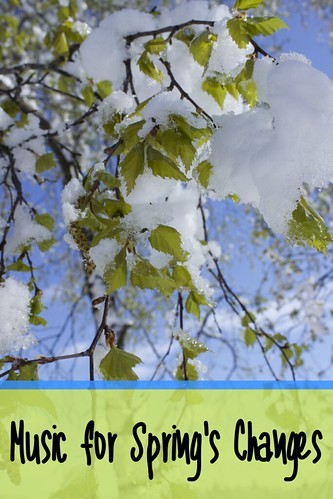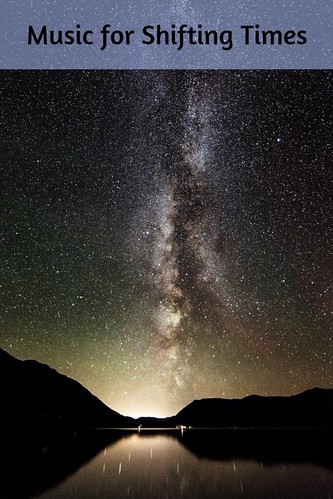Music for Spring's Changes
Music for shifting times: that is what we've called this series. Part of the idea behind the music shared with you in the series is to guide you to music which may help you think about or live through the unexpected, disconcerting, strange -- choose your own more emphatic adjective if you like -- situations facing the world.
It is not a series about songs of protest. There are people writing those; that's not my purpose, or my calling. It is important to help you think about what's going on, though, and perhaps, through music, to find perspective, or common ground, or hope, or courage.
The reason I am saying all this just now is that four of the songs in this story have a bit more directly to do with the shifts we are all facing than some of the music in other stories. They ask and invite good questions, and there are threads of hope, but you may find them unsettling. There's a place for that. too, in these times. It'll not become a change of direction, but it is part of the story.

Paul McKenna is a Scotsman, from Glasgow, a graduate of the Royal Conservatoire of Scotland. His Paul McKenna Band has been called one of the best young folk bands to come out of Scotland in recent years. He lived in the United States for several years. One result of that was his song The Dream. He asks questions you will want consider.You may find it recorded of the Paul Mc Kenna Band album called Paths That Wind.
Gretchen Peters is a top class, award-winning Nashville singer and songwriter. So are her friends Suzy Bogguss and Matraca Berg. Each of them chooses the folk inflected side of country, so while you will find excellent songwriting, do not be expecting glitz. The story hardly lends itself to that, in any case.Their song Black Ribbons came from thinking about the 2010 oil spill in the Gulf of Mexico. They give what could remain a news headline a human and poetic dimension. Peters sings it here, and you will find it recorded on her album Blackbird.
What do you follow that with? Amy Grant's song Better Than a Hallelujah works. Whether you share Grant's faith or not, the repeated lines of "We pour out our miseries/God just hears a melody" remind that whatever higher power you think about, connection and communion and lasting support are at the essence. Not always easy to accept or to discern, especially in the midst of shifting times, that's true, but present. The song was written by Sarah Hart and Chapin Hartford. It is recorded on Grant's album Somewhere Down the Road.
Kathy Mattea has long had an ear and a heart for seeking out songs with significance and edge beyond the day to day. Sometimes these are songs with humour, sometimes, they are love songs. At times they reference places special to her, sometimes, they include a political dimension, sometimes, they have a spiritual one. Mattea has forged a career on her own terms. One of those terms is courage. That, and excellent, pitch perfect musical taste and understatement, are present in Mattea's take on Mary Gauthier's song Mercy Now. It is recorded on Mattea's album Pretty Bird.
One of the things about music -- and, I hope, about these songs -- is that it reminds us that we are all in this together. Different and differences in all sorts to ways, to be sure. But together. Carrie Newcomer's song Sanctuary offers ways to think about that. You may find it on Newcomer's albums The Beautiful Not Yet and Live at the Buskirk Chumley.
Thank you for staying with us through this journey. Below, you'll find a link that will take you to an article which has a bit more backstory on the series. It also has links to a number of the stories, including ones called Listening for Community, Music for Winter's Changes, and The Geography of Hope.

Kerry Dexter is Music Editor at Wandering Educators. You may reach Kerry at music at wanderingeducators dot com.
You may find more of Kerry's work in National Geographic Traveler, Strings, Perceptive Travel, Journey to Scotland, Irish Fireside, and other places, as well as at her own site, Music Road.




















